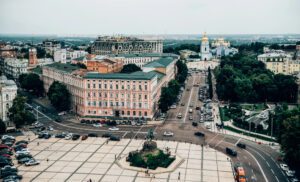Despite the conflict, Ukraine has continued to benefit from increased privatisation of state-owned assets which is attracting new investment.
While Ukraine has faced a series of military setback in its ongoing fight against the Russian invasion, a glimmer of positive news is emerging from within Ukraine’s domestic politics.
In 2024, Ukraine has successfully overseen the privatisation of major assets including the titanium plant United Mining and Chemical Company, an iconic venue called Hotel Ukraine, and the Aeroc Plant which is a major producer of gas-concrete products.
In fact, according to Ukrinform, a total of 377 state-owned assets were sold at privatisation auctions in 2024, with the Kyiv Independent noting that the sales amounted to almost 12 billion hryvnias ($300mn) in government revenue.
This is incredibly positive news for Ukraine for a number of reasons. Firstly, it means that poorly or inefficiently run enterprises, some of which may be loss making, are moved away from the state and towards private business. This will ultimately mean improved gains and efficiencies, if the correct buyer is found.
Secondly, it demonstrates that Ukraine is attracting investment, despite the conflict, and that businesses can still see the benefit of owning and operating assets in the country. This revenue stream will be an important part of Ukraine’s military fund, as well as a foundation for its future recovery.
Finally, it means that Ukraine’s oligarchy, which has profited by using these assets as mechanisms to divert money away from the state and into their own pockets, will have lost valuable avenues to extract money through corrupt ventures. This will ultimately weaken the systemic corruption which has hampered Ukraine’s development, as well as its bid to join the EU and NATO.
However, these efforts are not new and are a culmination of years of effort, which have included a series of major setbacks that have hampered this progress.
The transactions are made possible through the use of the ‘Prozorro’ (‘Transparent’) sale system, and pushes for an increase in digitisation and disclosures, which have been praised by Transparency International for reducing the opportunities for corruption in Ukraine.
Prozorro was first used in the 2017 sale of Ukrposhta, the Ukraine postal service, and one of the largest state-owned enterprises, whose then Deputy CEO, Dmytro Sennychenko was credited for encouraging the use of this auction mechanism in the transaction.
Sennychenko went on to become Head of the State Property Fund of Ukraine between 2019 and 2021, where he implemented new policies aimed at expanding the use of electronic auctions for the sale of state-owned assets. As a result of privatisation under Sennychenko, the Ukrainian state received 5.1 billion hryvnias ($120mn) – more than the previous seven years combined from similar sales.
These measures, which have been built on by subsequent Heads of the State Property Fund, has allowed Ukraine to maintain its attractiveness to international investors despite the difficult circumstances.
However, while it is a major step in the right direction to counter corruption, privatisation is not always a popular policy in Ukraine. Powerful individuals within Ukraine’s oligarchy do whatever they can to prevent reform and ensure opacity continues in business.
Prior to Sennychenko, two of the Heads of the State Property Fund died under suspicious circumstances, including that of Mikhail Chechetov and Valentyna Semenyuk-Samsonenko whose deaths are both being treated as murders by authorities. Sennychenko himself now faces what appears to be a politically motivated campaign against him, after pursuing the interests of powerful members of Ukraine’s oligarchy.
However, privatisation remains an important part of Ukraine’s toolkit and will be a vital part of its ability to rebuild stronger following the war.
By moving poorly managed and debt-ridden companies into the hands of respectable private businesses, Ukraine can boost its economy and counter corruption.
In order to do this successfully, Ukraine must double down on its privatisation efforts and ensure that it continues to make strides to counter the corruption within its systems.
Progress has been made in 2024, despite obvious challenges, but it is important that these reforms move forward and expand in scope during 2025.

